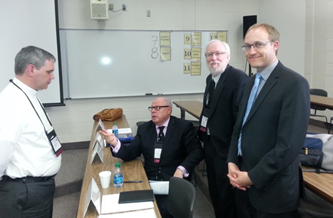Symposium 2014: Australia

Reported by Jordan Pendergrass
On Monday, 6 October 2014, an entire session of the International Law and Religion Symposium was dedicated to Australia. Two points during the breakout session became very clear: change in Australia is happening and religious freedom is becoming an increasingly important right. In a session moderated by Arthur L. Edgson, the experts who delivered remarks during this session were Neil Foster, Professor, Newcastle Law School; Neville Rochow, Barrister/Board Member, University of Adelaide Research Unit for Society, Law, and Religion; and Nigel Zimmermann, Private Secretary to Most Reverend Peter Comensoli, Archdiocese of Sydney.
Professor Foster used two cases, one from Victoria and the other originating from Queensland, to demonstrate how a Western legal system can intersect with religious commitment. Professor Foster first explained that in Christian Youth Camps v Cobaw, the Victorian Court of Appeals ruled that a camping organization connected with the Christian Brethren denomination unlawfully discriminated against “WayOut”, a project designed to provide support and suicide prevention services to youth with same gender attraction. He noted how this ruling was problematic, in a legal sense, because the Justices were divided on multiple issues. Moreover, the ruling was especially problematic for the youth camp and its affected employee because of the effective loss of ability to practice religion in a commercial marketplace. Professor Foster’s second example, Iliafi v The Church of Jesus Christ of Latter-Day Saints Australia, addressed the matter of conflict within a single religious body. This class action was brought by a number of Samoan-speaking church members, against the leadership of the church, with the aim of restoring some Samoan language meetings that had been replaced with English language meetings. The Full Court of the Federal Court of Australia ruled that the religious freedom of the Samoan worshippers had not been denied and therefore no relief would be granted. It was determined that a legal override of the decision by church leaders would have been an improper interference with the freedom of church leadership.
Mr. Rochow continued the discussion by addressing a hot topic: same-sex marriage. Mr. Rochow’s presentation was entitled: “The Incurable Malaise: Whether the decisions in Commonwealth v ACT and Baskin v Bogan are symptomatic of early onset dystopia.” He gave a brief overview of Australia’s federal Marriage Act and the Marriage Equality (Same Sex) Act 2013, and then described the way in which the case came before the High Court. The High Court delivered judgment quickly, ruling that the new law permitting same-sex marriage had “no effect”. Mr. Rochow indicated that this ruling, although preferred by many, increased uncertainty regarding multiple points of the federal marriage power. Remarks were next focused on the decision by the United States Court of Appeals for the Seventh Circuit in Baskin v Bogan, in which the Court secured the legal permission to same-sex marriage in a most peculiar manner. Mr. Rochow concluded by addressing the fact that social values that were once widely accepted are now open to question, and, given the changes in the social environment, religious freedom is crucial.
Dr. Zimmermann discussed the unique history of Australia and the consequence of same for the future of law and religion. He made observations regarding three elements missing from the national narrative: serious religious conflict; serious political conflict; and high octane compromise related to the balance of power. Dr. Zimmermann described how the great social and political changes facing the nation have no real precedent and that, by extension, the responses to these changes must be learned. He states, for example, that the cultural battle related to same-sex marriage has already been lost in the media; however, there remains much work to be done on a political and legal level. Three challenges facing society, including those with religious beliefs, are how to educate, how to mobilize, and how to inspire passion.
The Annual Symposium is organized and hosted by the International Center for Law and Religion Studies of the J. Reuben Clark Law School at Brigham Young University.